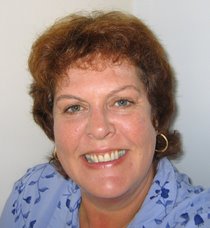‘When I am an old woman I shall wear purpleWith a red hat which doesn't go and doesn't suit me. And I shall spend my pension on brandy and summer gloves’
(from a poem by Jenny Joseph)
This poem always reminds me of my grandmother, who was a rebel throughout her life in one way or another and who dealt with old age the same way. I remember taking her out to lunch when she was 86. Her long silver hair was wound up in a granny-type bun and she leaned heavily on a silver-topped walking stick, but everyone who saw her was noticeably cheered at the sight of her smiling face, bright red and orange dress, purple stockings and blue paisley shawl. A fashion plate she was not, but an inspiration to all those about her? Yes, indeed.
Getting older is one of the harder things we have to deal with, even though we know it’s inevitable and a part of being alive. We still fight it with creams and potions, hair dye, manic exercise and anything else the media tells us will work.
The fact is that the people who age gracefully and healthily are mostly those who have accepted the changes of ageing, rather than see them as some sort of crises. Ageing changes everyone. We’re all in the same boat and we should accept that life just does not stay the same. After all, it would become very tedious if it did.
There is no evidence that creams, vitamin supplements or trends such as calorific reduction help you stay younger. Nor do botox, plastic surgery or anti-ageing drugs do any more than briefly stave off what will come to us all eventually. Certainly there are inherited genes which give some people a head start regarding ageing, but we’re all capable of extending our active lives without resorting to artificial means.
Obviously we need to look after ourselves physically, which involves:
Not smoking
A balanced diet
7-8 hours sleep each night
Drinking lots of water
Not overdoing the alcohol
Moisturising your skin
Moderate daily exercise
However, it’s interesting that in studies of Asians who have lived to over a hundred years old, the common factors in their lives appear to be: a mostly vegetarian diet as they get older, some daily exercise, usually in the form of walking and/or stretching exercises (such as tai chi), plenty of laughter, having a positive mental attitude and being regularly occupied in some activity they’re passionate about.
Research has increasingly shown that your emotional wellbeing is fundamental in leading an active healthy life when you’re old. This includes having a good self-image, a good social support, reducing stress and keeping mentally active.
So, keep in touch with friends, don’t vegetate at home watching the TV. Communicate. Go out and about and meet new people. If you have a tendency to get depressed seek help. Don’t obsess about your weight and what you eat. If you’re miserable with your lifestyle, then make changes. Even small changes can have a huge effect on your emotional wellbeing. Try to achieve a healthy balance in your life.
Find ways and make time to relax, or start meditating. Laugh a lot and try to move on from guilt, grief or hurt. Take time out to enjoy simple things and surround yourself with what you like and love.
The old adage ‘use it or lose it’ very much applies here. Keep your brain working. Play games like chess or cards. Do crosswords or sudoku. Use your memory. Learn new things or take up past interests. Above all: be creative. As one man who has lived to be an active hundred-year-old says:
‘The secret of vitality in any human being is the desire to do something creative in life.’
Sunday, September 2, 2007
Subscribe to:
Comments (Atom)
